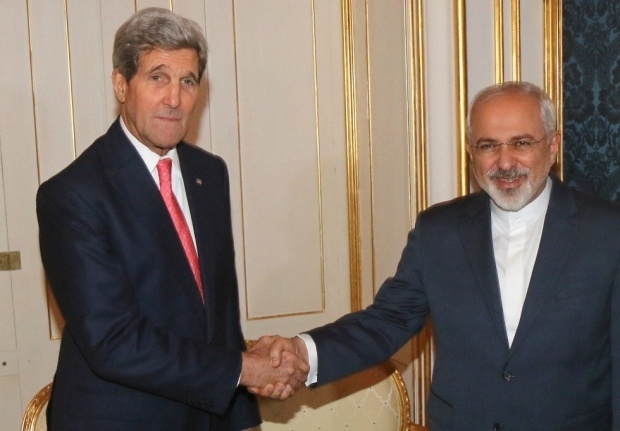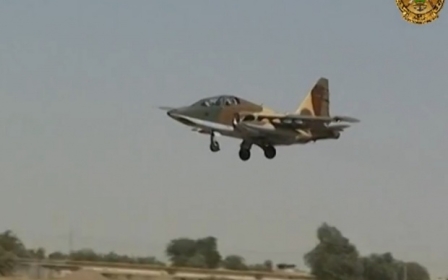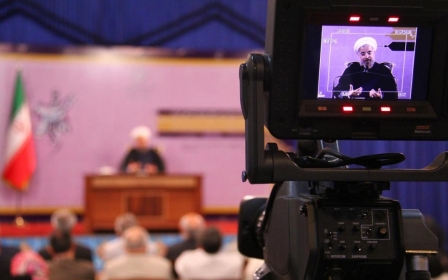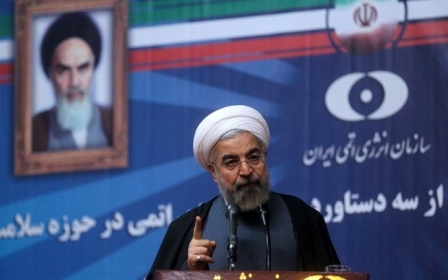Kerry welcomes 'positive' Iran strikes against IS

US Secretary of State John Kerry on Wednesday welcomed any Iranian military action against Islamic State (IS) group in Iraq as "positive" after the Pentagon said Tehran had carried out air strikes against the group.
But Tehran denied carrying out air strikes against IS.
"There has been no change to Iran's policy to provide support and advice to Iraqi officials in the fight against (IS)," foreign ministry spokeswoman Marzieh Afkham said.
Kerry, hosting a meeting of an anti-IS coalition in Brussels, said US-led international air strikes were finally stopping the advance of the militants across Iraq and Syria, but said it could take years to defeat them.
Kerry told the Brussels meeting of officials from 60 states in the coalition that a campaign of around 1,000 strikes had made a "significant" impact on IS, which declared a caliphate across parts of Syria and Iraq in June.
"Our commitment will most likely be measured in years," he told the meeting at NATO headquarters, adding that the partners would "engage in this campaign for as long as it takes to prevail".
But, in a sign of the deepening complexity of the regional conflagration, Syria's Iranian-backed President Bashar al-Assad criticised the Western and Arab air strikes for having no effect.
"You can't end terrorism with aerial strikes. Troops on the ground that know the land and can react are essential," he said in this week's edition of French magazine Paris Match.
"That is why there haven't been any tangible results in the two months of strikes led by the coalition. They would of course have helped had they been serious and efficient."
'Understanding' with Iran
Kerry denied there was any military coordination with Iran after the Pentagon said that Iranian F-4 Phantom jets -- acquired from the United States before the 1979 Islamic revolution -- had deployed against IS fighters in Iraq's eastern Diyala province.
He suggested, however, that there was an understanding between Iran and the US to tackle a common threat.
"If Iran is taking on (IS) in some particular place... and it has an impact, then it's going to be net effect (that) is positive," Kerry told a press conference after the meeting.
In Washington, US defence officials said the Iranian air raids were part of a pattern in which Iranian or American military advisers have carved out separate spheres in Iraq.
"There's a tacit understanding we're not going to operate in the same space. And they're not targeting American forces," a defence official, who spoke on condition of anonymity, told AFP.
The coalition issued a statement saying that the militant group's "advance across Syria and into Iraq is being halted," and that Iraqi and Kurdish forces were reclaiming territory.
They also agreed to develop a "multifaceted" strategy to combat the IS group, including stopping the flow of foreign fighters, cutting finance and "delegitimisation" of its powerful, social media-driven brand.
Kerry is due Thursday to attend the Organization for Security and Cooperation in Europe's ministerial meeting in Basel, Switzerland, which will focus on international terrorism and the Ukraine crisis.
EU justice ministers will also meet separately in Brussels to discuss ways of improving the legal battle against IS.
Shifting alliances
The United States launched its first strikes against IS in Iraq in August. In late September the strikes were extended to IS targets in Syria, involving the United States as well as a number of allies.
Saudi Arabia, the United Arab Emirates, Jordan and Bahrain are taking part in the air strikes in Syria. Australia, Belgium, Britain, Canada, Denmark, France and the Netherlands are participating in Iraq.
The US has carried out the vast majority of the strikes against IS, which is estimated to number around 30,000 militants.
The Syrian conflict has created a constantly shifting patchwork of regional alliances, the most unlikely being that of Washington and Tehran.
Iranian forces have been active on the ground in Iraq assisting Shiite militia and Baghdad government units, but this was the first time the United States had said the Iranian air force was taking part.
"It was in eastern Diyala province," Pentagon spokesman Colonel Steven Warren said of the air strike. "We have not had any air activity there."
"This is the first time we've seen it," Warren told reporters.
The British military, part of the US-led international coalition against IS, is also aware of Iranian forces in Iraq but does not cooperate with them, Lieutenant General Gordon Messenger told lawmakers in London.
"We've known that Iran has had forces deployed into Iraq for some time," Messenger said, adding that Britain does not "deconflict" with the country's forces -- a term meaning to coordinate to avoid accidental encounters in the field.
"Certainly we as a nation do not deconflict with Iran in anything that we do," Messenger said.
"As for the presence of, and co-ordination, that was reported this morning, I can't comment on that."
Weapons were known to be deliveried from both Tehran and Washington to the Iraqi army and Kurdish forces.
Strange bedfellows
The fight against IS group is bringing together strange bedfellows, experts said.
"The situation is extremely delicate," said Rosemary Hollis, professor of international politics at London's City University.
"For Iran and the United States to be on the same side against a Muslim organisation -- albeit a radical Salafist organisation that is using terror tactics against the population in Iraq -- this is too embarrassing to acknowledge in the open," she added.
Another expert, Denis Bauchard from the French Institute on International Relations, said that "paradoxically, Iran and the United States have basically become allies" against the Islamic State.
"This confirms what we already know: Iran is a key player in all the major regional issues," the expert told AFP.
And most experts believe that even if there is no direct military coordination between historic foes Iran and the United States, some degree of information sharing must be in place -- most likely via the Iraqi authorities.
Didier Billion, from the Paris-based Institute of International and Strategic Relations, said: "It's not yet an alliance, but it's certain that the Iranians have an interest in getting involved in international affairs."
"In effect, (Iran's supreme leader Ayatollah Ali) Khamenei has set Iran up as America's silent partner in the Middle East," wrote Michael Doran from the US Brookings Institute in a recent commentary.
Both sides have to tread carefully. "Iran wants to act discretely so as not to appear dependent on a coalition run by the United States," said Bauchard. "It is a motley coalition, because its members have different goals."
Billion added it was a "complicated game."
"Let's not forget that in September, France wanted to invite Iran to an international conference on Iraq but ran up against a US and Saudi veto," he recalled.
Meanwhile, the Obama administration is expected to go on the offensive in the Republican-controlled Congress to dissuade lawmakers from passing new sanctions against Tehran over its nuclear programme as international negotiations with Iran are still ongoing.
New MEE newsletter: Jerusalem Dispatch
Sign up to get the latest insights and analysis on Israel-Palestine, alongside Turkey Unpacked and other MEE newsletters
Middle East Eye delivers independent and unrivalled coverage and analysis of the Middle East, North Africa and beyond. To learn more about republishing this content and the associated fees, please fill out this form. More about MEE can be found here.




